🚀 From Google Podcasts to Moon FM in No Time: Your Hassle-Free Migration Guide
👉
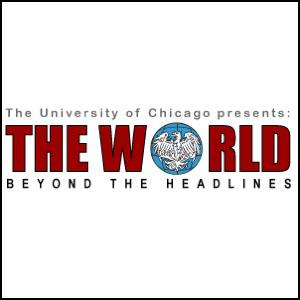
 Thanks to demand from big emerging economies, most South American governments have become increasingly “resource nationalistic” and have ramped up social spending to meet the needs of the poor and the indigenous, causing poverty levels to drop – at the same time as poverty has been on the increase in the United States.
Will the U.S. continue losing influence in Latin America? Will China soon dominate the area both commercially and strategically? Can the U.S. do business with countries from Mexico to Argentina without interfering in their internal affairs? Journalist Hal Weitzman provides an in-depth analysis of these questions in Latin Lessons: How South America Stopped Listening to the United States and Started Prospering.
Thanks to demand from big emerging economies, most South American governments have become increasingly “resource nationalistic” and have ramped up social spending to meet the needs of the poor and the indigenous, causing poverty levels to drop – at the same time as poverty has been on the increase in the United States.
Will the U.S. continue losing influence in Latin America? Will China soon dominate the area both commercially and strategically? Can the U.S. do business with countries from Mexico to Argentina without interfering in their internal affairs? Journalist Hal Weitzman provides an in-depth analysis of these questions in Latin Lessons: How South America Stopped Listening to the United States and Started Prospering. A talk by David Scheffer, Director of the Center for International Human Rights at Northwestern University. As senior adviser to Madeleine Albright and then as President Clinton’s ambassador-at-large for war crimes issues, David Scheffer was at the forefront of the efforts that led to criminal tribunals for the Balkans, Rwanda, Sierra Leone, and Cambodia, and that resulted in the creation of the permanent International Criminal Court. All the Missing Souls: A Personal History of the War Crimes Tribunals is Scheffer’s gripping insider’s account of the international gamble to prosecute those responsible for genocide, war crimes, and crimes against humanity, and to redress some of the bloodiest human rights atrocities in our time.
Introduction by Susan Gzesh, Executive Director of the University of Chicago Human Rights Program and Senior Lecturer in the College.
A talk by David Scheffer, Director of the Center for International Human Rights at Northwestern University. As senior adviser to Madeleine Albright and then as President Clinton’s ambassador-at-large for war crimes issues, David Scheffer was at the forefront of the efforts that led to criminal tribunals for the Balkans, Rwanda, Sierra Leone, and Cambodia, and that resulted in the creation of the permanent International Criminal Court. All the Missing Souls: A Personal History of the War Crimes Tribunals is Scheffer’s gripping insider’s account of the international gamble to prosecute those responsible for genocide, war crimes, and crimes against humanity, and to redress some of the bloodiest human rights atrocities in our time.
Introduction by Susan Gzesh, Executive Director of the University of Chicago Human Rights Program and Senior Lecturer in the College. In this talk, Robert Pape presents findings from the Chicago Project on Security and Terrorism demonstrating that, contrary to popular belief, religion alone motivates only a tiny minority of suicide attacks. Instead, the root cause is foreign military occupation, which triggers secular and religious people to carry out suicide attacks. From The World Beyond the Headlines series.
In this talk, Robert Pape presents findings from the Chicago Project on Security and Terrorism demonstrating that, contrary to popular belief, religion alone motivates only a tiny minority of suicide attacks. Instead, the root cause is foreign military occupation, which triggers secular and religious people to carry out suicide attacks. From The World Beyond the Headlines series. A speech by Anders Fogh Rasmussen, Secretary General of NATO. In his first visit to Chicago as Secretary General, Anders Rasmussen discusses Afghanistan, the lessons learned after eight years, and implications for future operations.
A speech by Anders Fogh Rasmussen, Secretary General of NATO. In his first visit to Chicago as Secretary General, Anders Rasmussen discusses Afghanistan, the lessons learned after eight years, and implications for future operations. A talk by political scientist Gilles Dorronsoro, visiting scholar in the Carnegie Endowment's South Asia Program. His research focuses on security and political development in Afghanistan, particularly the role of the International Security Assistance Force, the steps required to achieve a viable government in Kabul, and the conditions necessary for withdrawal scenarios. From the World Beyond the Headlines lecture series. Cosponsored by the Center for Middle Eastern Studies, the South Asian Language & Area Center, and the Center for East European and Russian/Eurasian Studies.
A talk by political scientist Gilles Dorronsoro, visiting scholar in the Carnegie Endowment's South Asia Program. His research focuses on security and political development in Afghanistan, particularly the role of the International Security Assistance Force, the steps required to achieve a viable government in Kabul, and the conditions necessary for withdrawal scenarios. From the World Beyond the Headlines lecture series. Cosponsored by the Center for Middle Eastern Studies, the South Asian Language & Area Center, and the Center for East European and Russian/Eurasian Studies.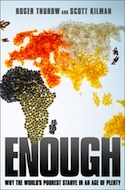 A talk by journalist and author Roger Thurow. For more than thirty years, humankind has known how to grow enough food to end chronic hunger worldwide. Yet while the "Green Revolution" succeeded in South America and Asia, it never got to Africa. Now, an impending global food crisis threatens to make things worse. In the west we think of famine as a natural disaster, brought about by drought; or as the legacy of brutal dictators. But in this powerful investigative narrative, Roger Thurow and Scott Kilman argue that in the past few decades, American, British, and European policies conspired to keep Africa hungry and unable to feed itself. As a new generation of activists work to keep famine from spreading, Enough sheds light on a humanitarian issue of utmost urgency. From the World Beyond the Headlines lecture series. Cosponsored by the Program on the Global Environment.
A talk by journalist and author Roger Thurow. For more than thirty years, humankind has known how to grow enough food to end chronic hunger worldwide. Yet while the "Green Revolution" succeeded in South America and Asia, it never got to Africa. Now, an impending global food crisis threatens to make things worse. In the west we think of famine as a natural disaster, brought about by drought; or as the legacy of brutal dictators. But in this powerful investigative narrative, Roger Thurow and Scott Kilman argue that in the past few decades, American, British, and European policies conspired to keep Africa hungry and unable to feed itself. As a new generation of activists work to keep famine from spreading, Enough sheds light on a humanitarian issue of utmost urgency. From the World Beyond the Headlines lecture series. Cosponsored by the Program on the Global Environment.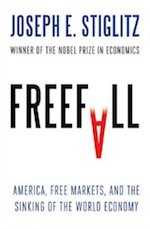 A talk by Columbia University professor Joseph Stiglitz. The current global financial crisis carries a "made in America" label. In "Freefall", Nobel laureate Joseph Stiglitz explains how America exported bad economics, bad policies, and bad behavior to the rest of the world, only to cobble together a haphazard and ineffective response when the markets finally seized up. Drawing on his academic expertise, his years spent shaping policy in the Clinton administration and at the World Bank, and his more recent role as head of a UN Commission charged with reforming the global financial system, Stiglitz then outlines a way forward building on ideas that he has championed his entire career: restoring the balance between markets and government; addressing the inequalities of the global financial system; and demanding more good ideas (and less ideology) from economists. "Freefall" combines an account of the current crisis with a discussion of the broader economic issues at stake. From the World Beyond the Headlines series.
A talk by Columbia University professor Joseph Stiglitz. The current global financial crisis carries a "made in America" label. In "Freefall", Nobel laureate Joseph Stiglitz explains how America exported bad economics, bad policies, and bad behavior to the rest of the world, only to cobble together a haphazard and ineffective response when the markets finally seized up. Drawing on his academic expertise, his years spent shaping policy in the Clinton administration and at the World Bank, and his more recent role as head of a UN Commission charged with reforming the global financial system, Stiglitz then outlines a way forward building on ideas that he has championed his entire career: restoring the balance between markets and government; addressing the inequalities of the global financial system; and demanding more good ideas (and less ideology) from economists. "Freefall" combines an account of the current crisis with a discussion of the broader economic issues at stake. From the World Beyond the Headlines series.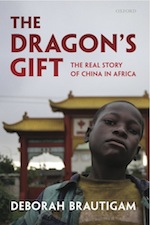 A talk by American University professor Deborah Brautigam. Is China a rogue donor, as some media pundits suggest? Or is China helping the developing world pave a pathway out of poverty, as the Chinese claim? This well-timed book provides the first comprehensive account of China's aid and economic cooperation overseas. Deborah Brautigam tackles the myths and realities, explaining what the Chinese are doing, how they do it, how much aid they give, and how it all fits into their "going global" strategy. Will Chinese engagement benefit Africa? Using hard data and a series of vivid stories ranging across agriculture, industry, natural resources, and governance, Brautigam's fascinating book provides an answer. Cosponsored by the Center for East Asian Studies. From the World Beyond the Headlines lecture series.
A talk by American University professor Deborah Brautigam. Is China a rogue donor, as some media pundits suggest? Or is China helping the developing world pave a pathway out of poverty, as the Chinese claim? This well-timed book provides the first comprehensive account of China's aid and economic cooperation overseas. Deborah Brautigam tackles the myths and realities, explaining what the Chinese are doing, how they do it, how much aid they give, and how it all fits into their "going global" strategy. Will Chinese engagement benefit Africa? Using hard data and a series of vivid stories ranging across agriculture, industry, natural resources, and governance, Brautigam's fascinating book provides an answer. Cosponsored by the Center for East Asian Studies. From the World Beyond the Headlines lecture series.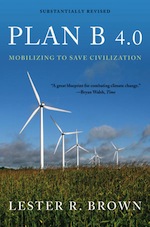 A talk by author and Earth Policy Institute founder Lester Brown. As fossil fuel prices rise, oil insecurity deepens, and concerns about climate change cast a shadow over the future of coal, a new energy economy is emerging. Wind, solar, and geothermal energy are replacing oil, coal, and natural gas, at a pace and on a scale we could not have imagined even a year ago. For the first time since the Industrial Revolution, we have begun investing in energy sources that can last forever. Plan B 4.0 explores both the nature of this transition to a new energy economy and how it will affect our daily lives. Cosponsored by the Program on the Global Environment. From the World Beyond the Headlines lecture series.
A talk by author and Earth Policy Institute founder Lester Brown. As fossil fuel prices rise, oil insecurity deepens, and concerns about climate change cast a shadow over the future of coal, a new energy economy is emerging. Wind, solar, and geothermal energy are replacing oil, coal, and natural gas, at a pace and on a scale we could not have imagined even a year ago. For the first time since the Industrial Revolution, we have begun investing in energy sources that can last forever. Plan B 4.0 explores both the nature of this transition to a new energy economy and how it will affect our daily lives. Cosponsored by the Program on the Global Environment. From the World Beyond the Headlines lecture series.Your feedback is valuable to us. Should you encounter any bugs, glitches, lack of functionality or other problems, please email us on [email protected] or join Moon.FM Telegram Group where you can talk directly to the dev team who are happy to answer any queries.